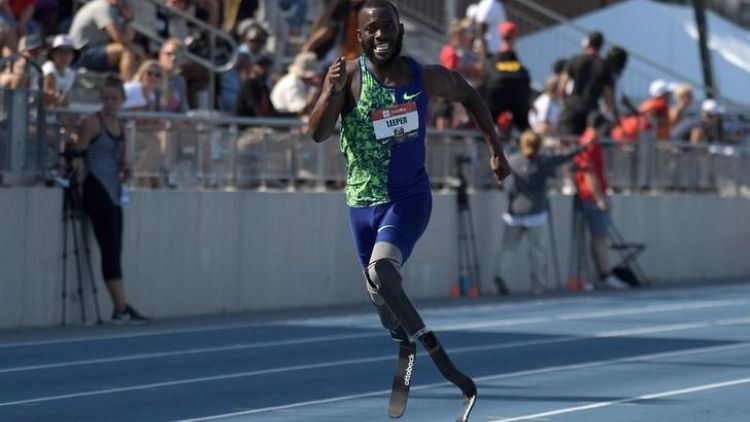(Reuters) - American double amputee Blake Leeper will not be eligible to compete in this month's world championships while an advisory group determines his eligibility, the IAAF, athletics' governing body, said on Saturday.
Leeper, who was born without legs below the knees, finished fifth in the 400 metres at the U.S. championships in July which normally would have qualified him for the Americans' world championships 4 x 400m relay squad.
But the International Association of Athletics Federations (IAAF) said on Saturday that the 30-year-old will not be eligible for the Sept. 27-Oct 6 championships in Doha.
"An application has been submitted by Mr Leeper to compete in the 2019 World Championships and the Tokyo 2020 Olympic Games which is under review by an advisory group," the IAAF said in a statement to Reuters.
"A recommendation from the advisory group will be made later this year so Mr Leeper will not be eligible to compete in this month's WCHs."
The advisory group will determine whether Leeper's prostheses give him an advantage over other competitors and it will be Leeper's burden to prove they do not, his lawyers said in a statement on Thursday.
The attorneys represented South African double amputee Oscar Pistorius, winning a 2008 ruling from the Court of Arbitration for Sport (CAS) that he could race against able-bodied athletes.
This time, they have objected to the burden of proof being shifted to Leeper, a silver medallist at the 2012 Paralympics.
"The IAAF placing the burden of proof on Mr. Leeper is inconsistent with the precedent of Oscar Pistorius, in which the IAAF had the burden of proof to show that Mr. Pistorius's prostheses provided him with an overall competitive advantage," Leeper's lawyers said.
"[It was] a burden that the IAAF failed to establish which enabled Mr. Pistorius to compete in IAAF events and the 2012 London Olympics."
Leeper himself also objected. "The IAAF placing the burden on disabled athletes to prove that their prostheses do not provide an overall advantage is wrong and unlawful," he said in the statement.
The IAAF said on Saturday it would not comment beyond its statement.
"The IAAF competition rules state clearly that mechanical assistance to athletes is not allowed during athletics competitions, unless the athlete can establish on the balance of probabilities that the use of an aid would not provide him with an overall competitive advantage," the IAAF told Reuters in July.
Leeper was allowed to compete in the U.S. championships on a conditional basis, U.S. officials have said, but the IAAF has declined to recognise his results this year.
"His results will not be ratified, because the athlete has not provided any evidence to IAAF that meets the rule stated above nor have the blades been classified under the new Maximum Allowable Standing Height (MASH) formula," the IAAF said in July.
(Reporting by Gene Cherry in Raleigh, North Carolina; Editing by Ian Chadband)
